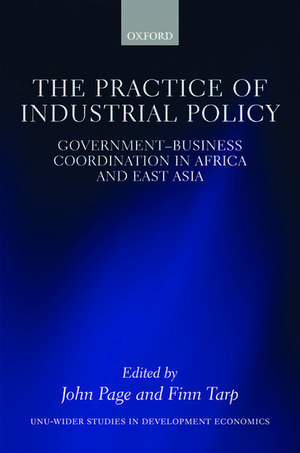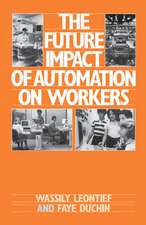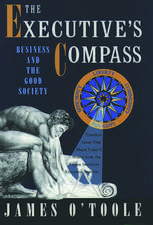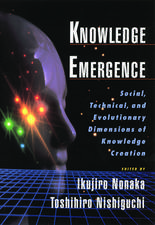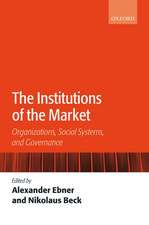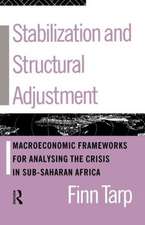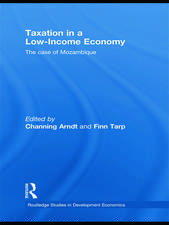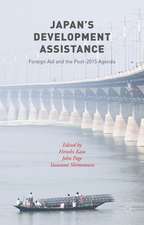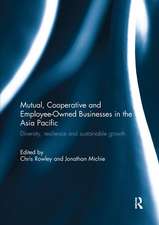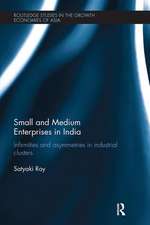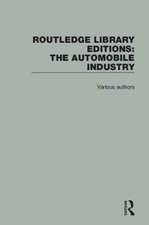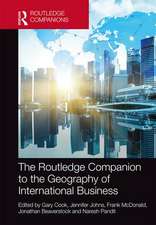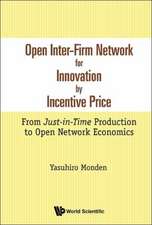The Practice of Industrial Policy: Government—Business Coordination in Africa and East Asia: WIDER Studies in Development Economics
Editat de John Page, Finn Tarpen Limba Engleză Hardback – 6 apr 2017
Din seria WIDER Studies in Development Economics
- 30%
 Preț: 504.34 lei
Preț: 504.34 lei - 26%
 Preț: 733.49 lei
Preț: 733.49 lei - 30%
 Preț: 597.88 lei
Preț: 597.88 lei - 17%
 Preț: 594.16 lei
Preț: 594.16 lei - 7%
 Preț: 159.68 lei
Preț: 159.68 lei - 13%
 Preț: 737.02 lei
Preț: 737.02 lei - 17%
 Preț: 583.39 lei
Preț: 583.39 lei - 28%
 Preț: 473.92 lei
Preț: 473.92 lei - 30%
 Preț: 501.49 lei
Preț: 501.49 lei - 30%
 Preț: 724.70 lei
Preț: 724.70 lei - 30%
 Preț: 748.64 lei
Preț: 748.64 lei - 31%
 Preț: 434.64 lei
Preț: 434.64 lei - 18%
 Preț: 333.97 lei
Preț: 333.97 lei - 34%
 Preț: 848.58 lei
Preț: 848.58 lei - 34%
 Preț: 847.76 lei
Preț: 847.76 lei - 34%
 Preț: 803.83 lei
Preț: 803.83 lei - 34%
 Preț: 954.23 lei
Preț: 954.23 lei - 34%
 Preț: 892.48 lei
Preț: 892.48 lei - 22%
 Preț: 188.78 lei
Preț: 188.78 lei - 30%
 Preț: 617.12 lei
Preț: 617.12 lei - 18%
 Preț: 334.18 lei
Preț: 334.18 lei - 27%
 Preț: 378.41 lei
Preț: 378.41 lei - 34%
 Preț: 1039.04 lei
Preț: 1039.04 lei - 34%
 Preț: 1043.37 lei
Preț: 1043.37 lei - 27%
 Preț: 329.58 lei
Preț: 329.58 lei - 34%
 Preț: 1292.22 lei
Preț: 1292.22 lei - 23%
 Preț: 1213.11 lei
Preț: 1213.11 lei - 34%
 Preț: 879.41 lei
Preț: 879.41 lei - 19%
 Preț: 652.21 lei
Preț: 652.21 lei - 34%
 Preț: 1039.15 lei
Preț: 1039.15 lei - 34%
 Preț: 892.84 lei
Preț: 892.84 lei - 27%
 Preț: 443.57 lei
Preț: 443.57 lei - 22%
 Preț: 526.67 lei
Preț: 526.67 lei - 30%
 Preț: 913.24 lei
Preț: 913.24 lei - 34%
 Preț: 997.55 lei
Preț: 997.55 lei - 31%
 Preț: 396.19 lei
Preț: 396.19 lei - 17%
 Preț: 413.16 lei
Preț: 413.16 lei - 34%
 Preț: 1188.13 lei
Preț: 1188.13 lei - 34%
 Preț: 817.30 lei
Preț: 817.30 lei - 30%
 Preț: 1012.76 lei
Preț: 1012.76 lei - 7%
 Preț: 360.77 lei
Preț: 360.77 lei - 31%
 Preț: 447.33 lei
Preț: 447.33 lei - 27%
 Preț: 1295.58 lei
Preț: 1295.58 lei - 31%
 Preț: 441.21 lei
Preț: 441.21 lei
Preț: 629.46 lei
Preț vechi: 902.01 lei
-30% Nou
Puncte Express: 944
Preț estimativ în valută:
120.44€ • 126.09$ • 99.66£
120.44€ • 126.09$ • 99.66£
Carte tipărită la comandă
Livrare economică 25-31 martie
Preluare comenzi: 021 569.72.76
Specificații
ISBN-13: 9780198796954
ISBN-10: 0198796951
Pagini: 332
Ilustrații: 21 Figures, 12 Tables, 5 Boxes
Dimensiuni: 162 x 241 x 26 mm
Greutate: 0.62 kg
Editura: OUP OXFORD
Colecția OUP Oxford
Seria WIDER Studies in Development Economics
Locul publicării:Oxford, United Kingdom
ISBN-10: 0198796951
Pagini: 332
Ilustrații: 21 Figures, 12 Tables, 5 Boxes
Dimensiuni: 162 x 241 x 26 mm
Greutate: 0.62 kg
Editura: OUP OXFORD
Colecția OUP Oxford
Seria WIDER Studies in Development Economics
Locul publicării:Oxford, United Kingdom
Notă biografică
John Page is a Senior Fellow in the Global Economy and Development Program at the Brookings Institution and a Non-resident Senior Fellow of the UNU World Institute for Development Economics Research (UNU-WIDER). He is also visiting professor at the National Graduate Institute for Policy Studies, Tokyo, Japan and a Research Associate of the Centre for the Study of African Economies at Oxford University. From 1980 to 2008 he was at the World Bank where his senior positions included: Director, Poverty Reduction, Director, Economic Policy, and Chief Economist, Africa. He is the author of several books and more than 100 published papers on economic development.Finn Tarp is Director of UNU-WIDER and Professor of Development Economics at the University of Copenhagen. He has some four decades of experience in academic and applied development economics research, teaching, and policy analysis. His field experience covers more than 20 years of in-country assignments in 35 countries across the developing world, including longer-term assignments in Swaziland, Mozambique, Zimbabwe, and Viet Nam. Finn Tarp has published widely in leading international academic journals alongside a series of books, and he is a member of the World Bank Chief Economist's 'Council of Eminent Persons'.
